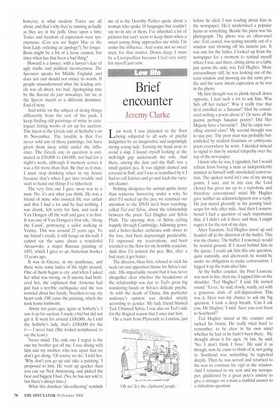Brief encounter
Jeremy Clarke
T ast week I was pinioned to the floor L./being subjected to all sorts of playful indignities by an imaginative and surprisingly strong young lady. Turning my head away to avoid a slap, I found myself looking at the inch-high gap underneath the sofa. And there, among the dust and the fluff, was a small garden pea. It was slightly dented and covered in fluff, and I was so transfixed by it I had to call fainites and go and fetch the vacuum cleaner.
Nothing dissipates the animal spirits faster than someone hoovering under a sofa. So after I'd sucked up the pea, we returned our attention to the DVD we'd been watching, called Ted and Sylvia, about the relationship between the poets Ted Hughes and Sylvia Plath. The opening shot, of Sylvia cycling happily through Cambridge, billowing gown, and a helter-skelter orchestra with oboes to the fore, had been depressingly predictable. I'd expressed my reservations, and been wrestled to the floor for my horrible cynicism. And then I'd noticed the pea. But, after a bad start, it got better.
The director, bless him, refused to stick his neck out and apportion blame for Sylvia's suicide. His impartiality meant that it was never altogether clear whether the breakdown of the relationship was due to Ted's great big wandering hands or Sylvia's delicate psyche. As with the death of Diana, this particular audience's opinion was divided strictly according to gender. My lady friend blamed Ted, I blamed Sylvia. I was also on Ted's side for the illogical reason that I once met him.
On a train from Plymouth to London, just before he died, I was reading about him in the newspaper. He'd modernised a popular hymn or something. Beside the piece was his photograph. The photo was an often-used one: Ted, seated, was staring intently out of a window and showing off his lantern jaw. It was one for the ladies. I looked up from the newspaper for a moment to remind myself where I was, and there, sitting alone at a table just across the aisle, was Ted Hughes. More extraordinary still, he was looking out of the train window and showing me the same profile and the same intent expression as he was in the photo.
My first thought was to plonk myself down opposite. I had such a lot to ask him. Was Sylv off her rocker? Was it really true that he'd enrolled as a Satanist? Had he considered writing a poem about it? Or were all his poems perhaps Satanist poetry? Did Her Majesty have a favourite? Did he enjoy travelling second class? My second thought was to stay put. The poor man was probably buttonholed by strident feminists or embryonic poets everywhere he went. I decided instead to signal to him by mental telepathy over the top of the newspaper.
[knew who he was, I signalled, but I would refrain from boring a man as independently minded as himself with unsolicited conversation. The spoken word isn't one of my strong points. I said, and in any case the Lord (Jesus) has given me up to a reprobate and therefore conventional mind. Mr Hughes gave neither an acknowledgment nor a reply. He just stared gloomily at the passing landscape for mile after mile. And then I remembered I had a question of such importance that, if I didn't ask it there and then, 1 might regret it for the rest of my days.
After Taunton, Ted Hughes stood up and headed off in the direction of the buffet. This was my chance. The buffet, I reasoned, would be neutral ground. If I stood behind him in the queue, I could ask him this one question, quite naturally, and afterwards he would be under no obligation to make conversation. I legged it up the train after him.
At the buffet counter, the Poet Laureate was next in line, then me. I tapped him on the shoulder. 'Ted Hughes'?' I said. He turned round. 'Ye-es,' he said, slowly, warily, yet with a generous dash of self-deprecation. This was it. Here was my chance to ask my big question. I took a deep breath. 'Can I ask you, Mr Hughes,' I said, 'have you ever been to Southend?'
Ted Hughes stared at the counter and racked his brains. He really tried hard to remember, to be clear in his own mind whether he had or he hadn't been there. He thought about it for ages. At last, he said, 'No. I don't think I have.' He said it as though, now he came to think of it, not going to Southend was something he regretted deeply. Then he was served and returned to his scat to continue his vigil at the window, And I returned to my seat and my newspaper, gladdened by a great poet's anxiety to give a stranger on a train a tnithful answer to a ridiculous question.


















































































































 Previous page
Previous page